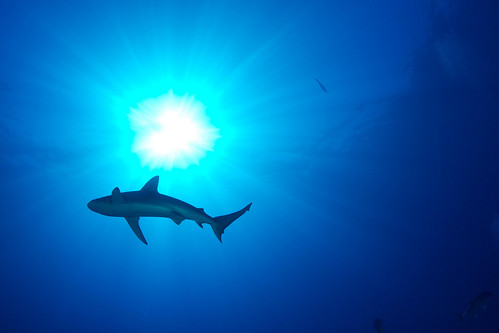 At the sixteenth conference of the Convention on International Trade in Endangered Species (CITES), delegates in a special committee voted in favor of listing five of the world's most threatened shark species on the Convention's Appendix II. This would allow only regulated, sustainable trade of these species.
At the sixteenth conference of the Convention on International Trade in Endangered Species (CITES), delegates in a special committee voted in favor of listing five of the world's most threatened shark species on the Convention's Appendix II. This would allow only regulated, sustainable trade of these species.But these listings are not final until a vote in the plenary session on the last day of the meeting, which is this Thursday. If one third of the delegates vote to reopen the debate, the shark proposal could go belly-up.
Why might that happen? Because Japanese and Chinese delegates are applying intense pressure (read: $) on certain poor countries in Africa and elsewhere to reverse their votes. Japan always does this, bribing countries with aid packages or even individual delegates with cash. And so, a week that has started with a monumental decision for sharks may conclude with another black eye for shark conservation and for CITES. (Earlier in the week, CITES delegates rejected a proposal spearheaded by Kenya to defer any legal sales of ivory and rhino horn for four years. The corruption, greed, cynicism, and sheer stupidity at CITES is causing it to crumble as a conservation mechanism; this is one symptom of a world that can no longer cope with the stresses we're creating.)
The species that should now be sailing to listing after the successful committee vote -- the oceanic whitetip, porbeagle and three species of hammerheads -- have all been traded to the ruin of populations, with the dried fins of the oceanic whitetip and hammerheads being especially prized in Asia for use in the luxury dish shark fin soup.
Remarkably, these facts are undisputed yet debate remains intense. There have been no scientific argument against listing these species and indeed, Japan, China and other opposing countries do not appear to have raised a single concern about the scientific merit of the proposals.
All they are arguing is that CITES -- the body where governments decide how to regulate international trade in wildlife -- is the wrong forum for regulating the international trade in certain types of wildlife (in this case, ocean species). They ignore the fact that several other commercial marine species are listed and that there is no other body that focused on international trade in wildlife.
Maybe I'll send all the CITES delegates one of those T-shirts that say, "I'm With Stupid."
Which is where the March 10 vote brings us hope. The shark proposals, which were predominantly sponsored by developing nations in Latin America, each received a positive vote from more that two-thirds of the nations voting, most of which are developing nations. They all agree that it is time to regulate international trade in these sharks. They are simply asking for all nations -- including the wealthy nations with large fishing fleets, such as Japan, and the nation that is consuming nearly all of the shark fins, China, to help them make this trade sustainable. There is no way to aid developing nations that is better than that.
To which, China and Japan continue to drone their talking points that listing these sharks would hurt developing countries. What is really hurting them, of course, is China and Japan.
If you want to go on record telling CITES delegates to vote yes to list oceanic whitetip, porbeagle and hammerhead sharks tell them that the world is watching -- and so are you.
Source: Huff Post Green
Image courtesy of USFWS Headquarters via Flickr (CC BY 2.0)
